Understanding Emotional Validation and Its Significance
Emotional validation is a foundational psychological process involving recognizing, understanding, and accepting another person's emotional experience without judgment. It extends beyond surface praise to an empathetic acknowledgment of feelings, which fosters trust, strengthens relationships, and promotes emotional regulation. In a world increasingly aware of mental health, understanding and practicing emotional validation is crucial for nurturing healthy emotional and behavioral development across all age groups, from children to adults.
Defining Emotional Validation and Its Importance
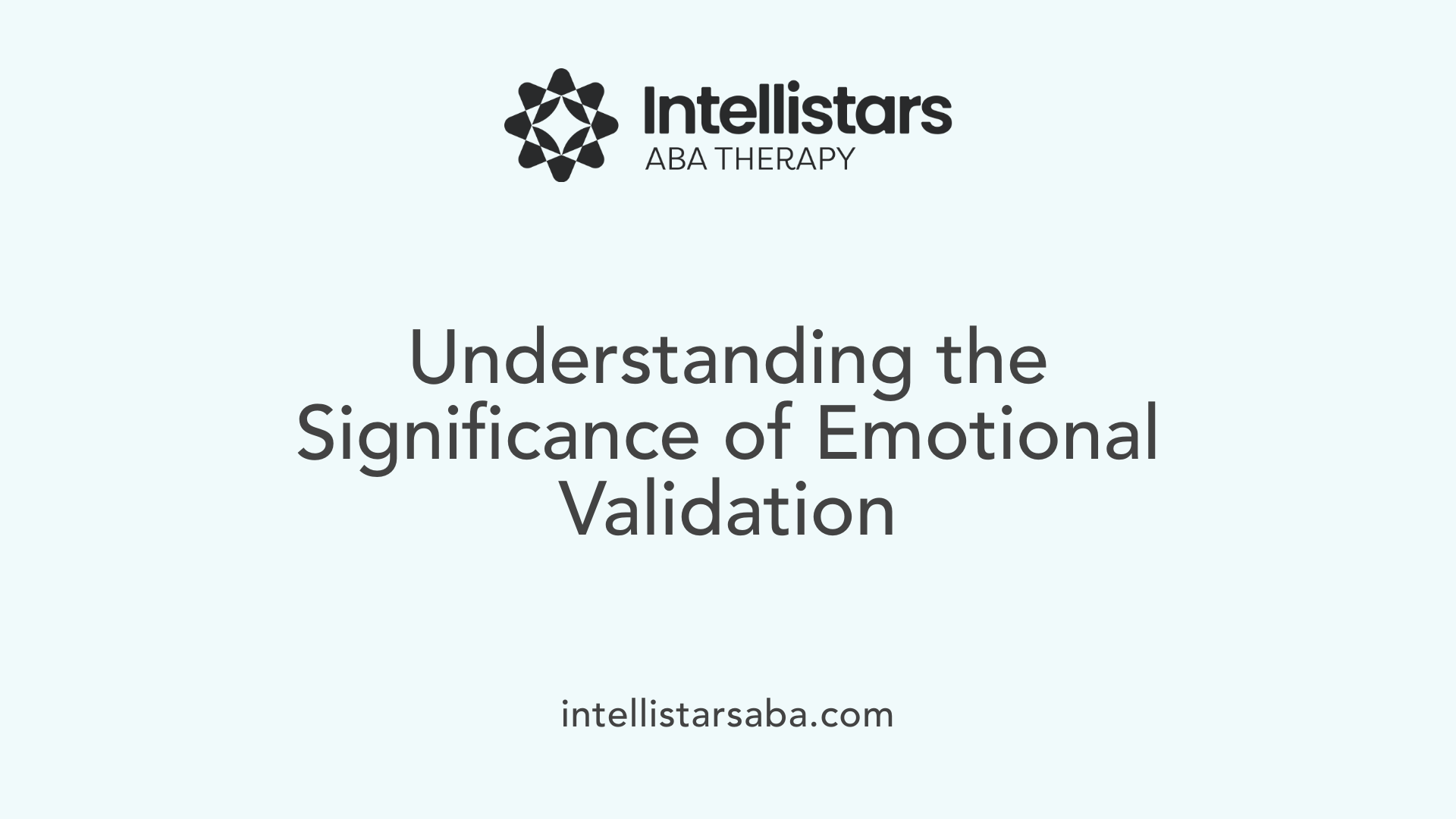
What is emotional validation?
Emotional validation is the act of recognizing, understanding, and accepting another person's feelings without judgment. It involves actively listening to someone, acknowledging their emotions, and expressing empathy. Validation does not necessarily mean agreeing with the feelings but confirming that the emotional experience is legitimate and worthwhile.
Validating emotions helps individuals feel supported, understood, and accepted. Using verbal cues like reflecting feelings or naming emotions, along with non-verbal gestures such as eye contact and attentive body language, strengthens emotional connection. It creates a safe environment where people can openly share their feelings without fear of criticism or dismissal.
Why is emotional validation essential?
Practicing emotional validation is vital for building and maintaining healthy relationships, whether in family, friendships, or therapy settings. It fosters trust and cooperation, improves communication, and encourages emotional growth.
When emotions are validated, individuals are more likely to develop self-confidence and resilience. Validation also helps reduce negative feelings like shame, guilt, and self-blame. By acknowledging emotions, especially difficult ones like sadness, anger, or fear, people can better regulate their feelings and avoid impulsive reactions.
Importantly, validation supports mental health by preventing the adverse effects of emotional invalidation, such as depression and anxiety. It provides emotional containment and security, allowing individuals to process their feelings healthily. Overall, emotional validation is a fundamental human need that fosters empathy, understanding, and emotional well-being.
The Impact of Emotional Validation on Emotional Regulation and Attachment
How does emotional validation influence emotional regulation?
Emotional validation significantly supports individuals in managing their feelings more effectively. When someone’s emotions are acknowledged and accepted without judgment, it helps reduce the intensity of negative feelings like anger, sadness, or shame. Validation teaches people to recognize their emotions, understand their causes, and express them healthily. This process encourages self-awareness, which is vital in emotional regulation.
Practicing validation also activates calming physiological responses, such as lowering heart rate and reducing stress hormones, especially for emotions like anger and shame. This physical calming effect makes it easier to think clearly and respond appropriately in emotional situations. Ultimately, validation builds resilience by helping individuals learn to hold and soothe their distress, leading to better impulse control, fewer reactive behaviors, and improved emotional well-being.
Role of validation in attachment and trust building
In close relationships, emotional validation is fundamental for establishing trust and a sense of safety. When caregivers or partners validate each other's feelings, it creates a secure bond marked by empathy and understanding. Children who are consistently validated tend to develop strong attachments because they feel safe to express vulnerabilities and confidences.
Validation fosters openness, making individuals more willing to share their inner world. This reciprocal exchange of understanding nurtures trust and deepens the emotional connection, promoting a secure attachment style. Throughout life, feeling validated helps individuals develop confidence in their emotional experiences and builds the foundation for healthy, empathetic relationships.
By continuously affirming others' feelings and perspectives, validation cultivates a caring environment where emotional needs are met, trust is reinforced, and attachment remains strong. In essence, validation acts as a cornerstone for emotional safety and healthy relational bonds.
Practical Strategies for Incorporating Emotional Validation in Daily Life
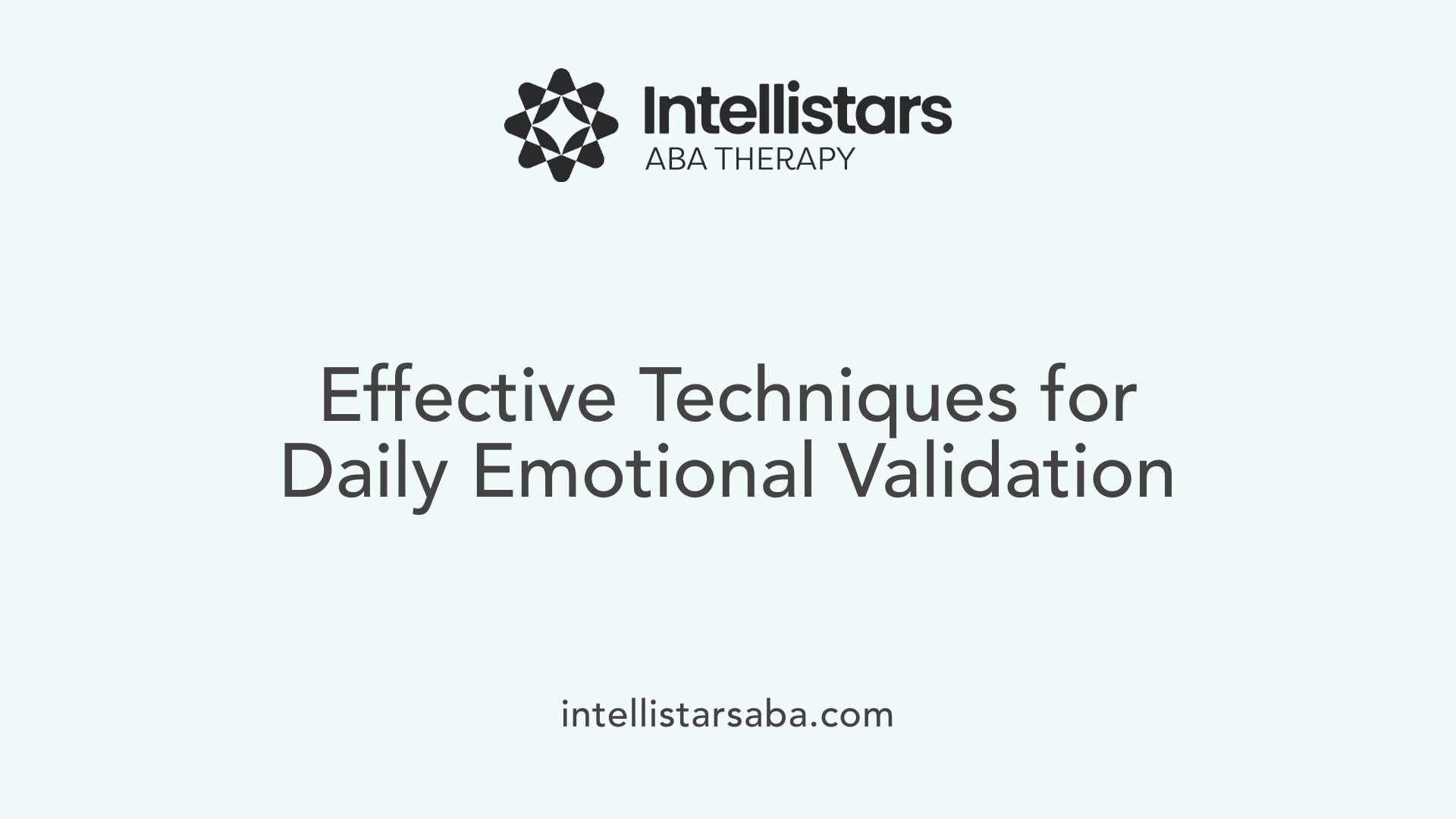
What are effective techniques for practicing emotional validation in everyday interactions?
Practicing emotional validation daily can significantly improve relationships and emotional well-being. One of the most effective methods is active listening. This involves giving your full attention to the person speaking, maintaining eye contact, and avoiding interruptions. Show that you're engaged through your body language, like nodding or leaning in, which signals your presence and interest.
Reflective listening is another powerful tool. It requires paraphrasing or summarizing what the other person has said, which demonstrates that you understand their feelings and perspective. For example, saying, "It sounds like you're really overwhelmed right now" shows recognition and empathy.
Non-verbal cues also play a vital role in validation. Paying attention to body language, facial expressions, and tone of voice helps you detect emotions that aren't explicitly stated. Mirroring these cues—such as matching their facial expressions or posture—can help the other person feel seen and understood.
Asking open-ended questions encourages deeper emotional sharing. Questions like "How did that make you feel?" or "What do you need right now?" invite individuals to explore and express their feelings more fully, creating a safe environment for emotional release.
Using validating language—acknowledging emotions without judgment—is crucial. For instance, saying "It's understandable to feel upset about that" recognizes their experience without trying to dismiss or fix their feelings.
Patience and mindfulness are also essential components. Validating emotions takes time and requires staying present without rushing to solve problems. Remaining calm and patient even when emotions run high helps foster trust and openness.
Incorporating these techniques consistently builds emotional resilience and trust, allowing individuals to feel genuinely supported and understood in everyday interactions.
Validation in Dialectical Behavior Therapy and Therapeutic Settings
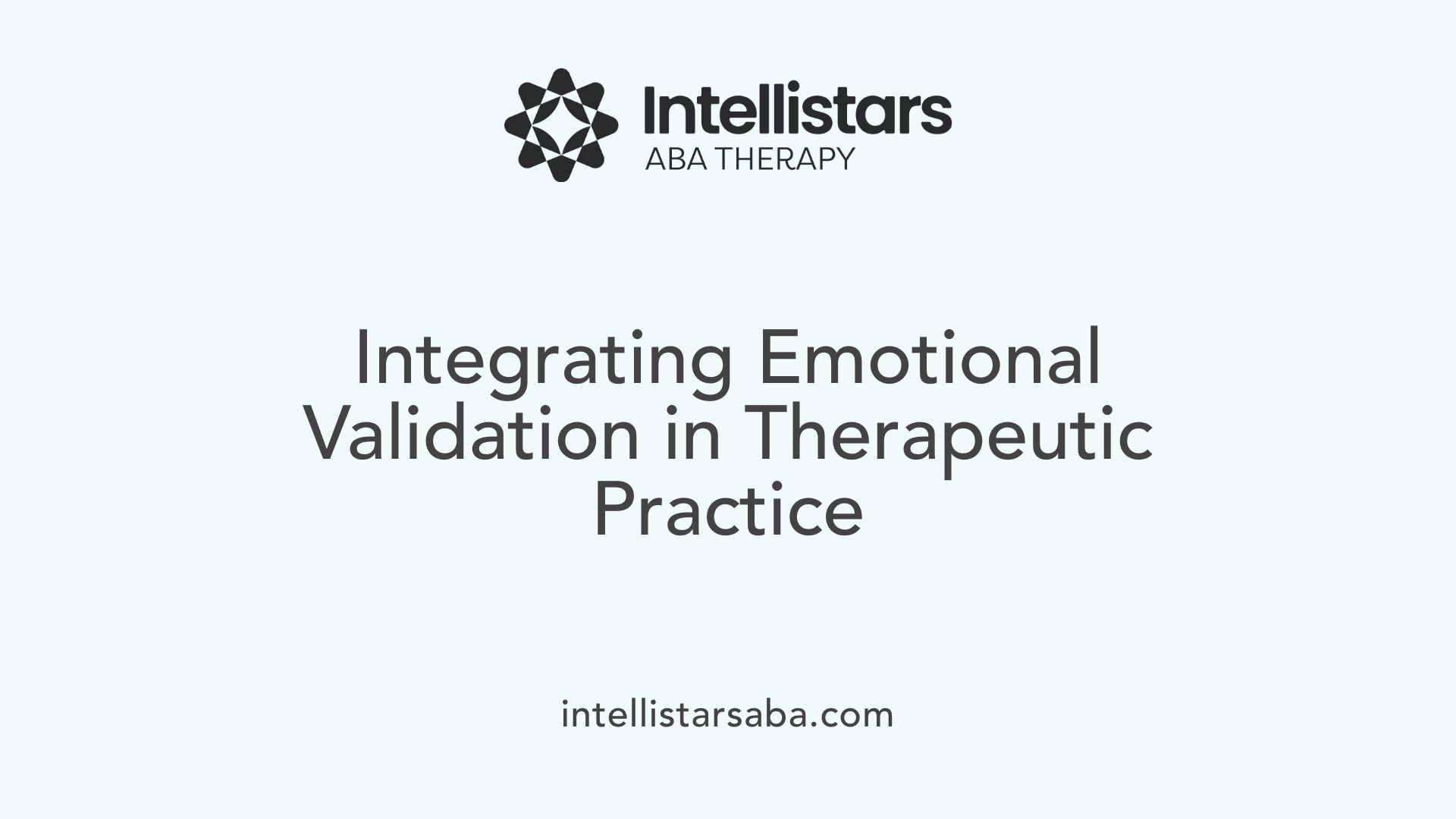
How is emotional validation integrated into therapeutic approaches like Dialectical Behavior Therapy (DBT)?
In DBT, emotional validation is a central practice that helps clients accept and comprehend their feelings without judgment. Therapists use a detailed six-level validation process to establish a deep sense of being understood and respected. These levels include showing interest, accurately reflecting feelings, uncovering unspoken feelings, and understanding the behaviors as responses to past events or emotional states.
Validation in DBT can be categorized into emotional, behavioral, or cognitive types. Emotional validation acknowledges primary feelings, behavioral validation recognizes actions as understandable responses, and cognitive validation supports underlying thoughts or beliefs.
Timing and context are crucial; validation helps de-escalate intense emotional episodes and fosters trust between therapist and client. It is balanced with strategies that promote change, such as skills training and behavioral interventions.
Additionally, clients are encouraged to practice self-validation—applying the same principles to their internal experiences. This approach strengthens emotional regulation, self-acceptance, and resilience, ultimately supporting long-term mental well-being.
Child and Adolescent Development Through the Lens of Validation
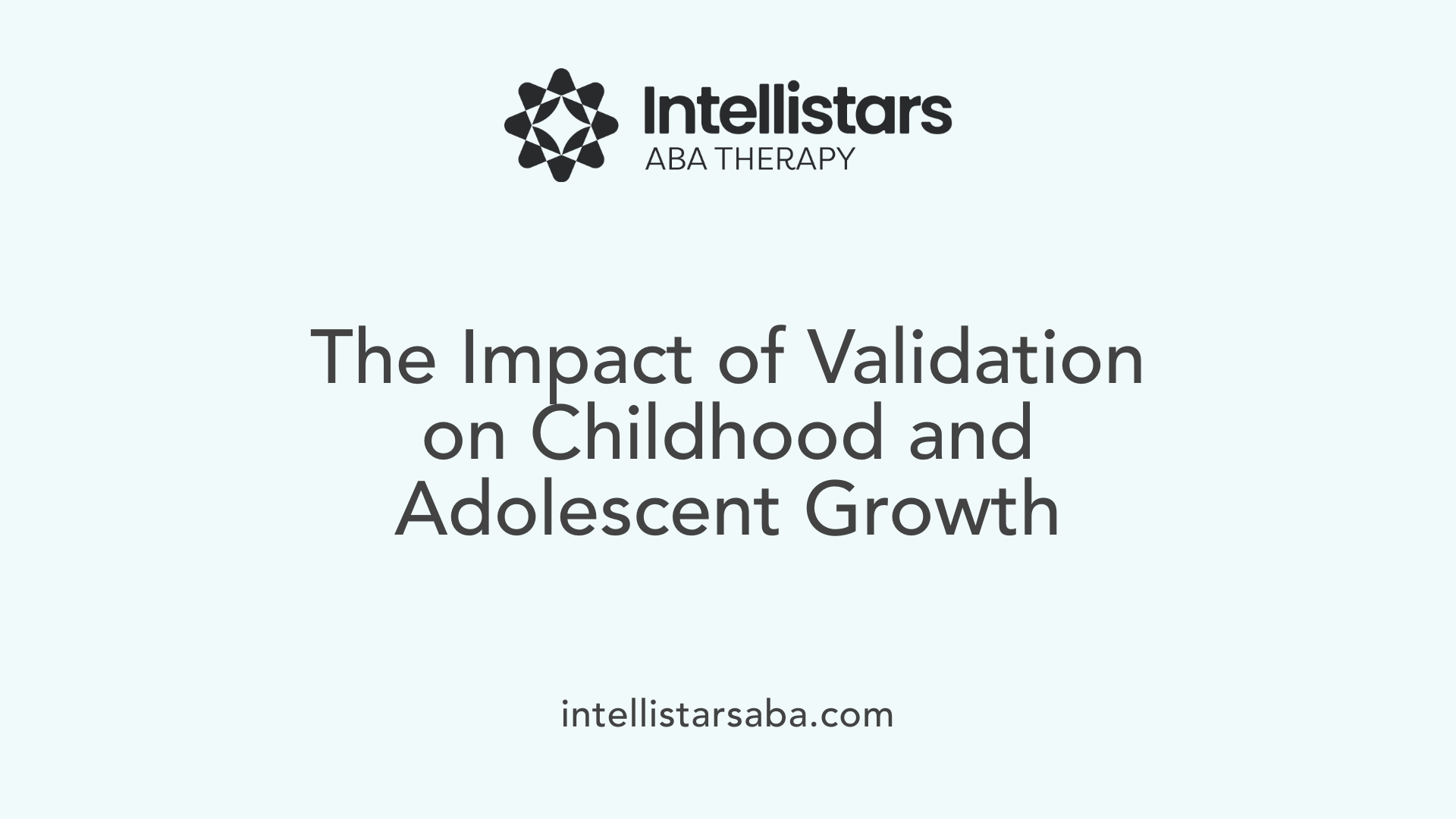
What role does emotional validation play in child and adolescent development?
Emotional validation is fundamental to healthy development during childhood and adolescence. When a child's emotions are acknowledged and understood, it creates a sense of safety and trust. This secure emotional environment encourages children to explore and express their feelings openly, which is vital for building emotional regulation skills.
Validating a child's feelings does not mean approving all behaviors but recognizing that their emotional experience is real and important. This recognition supports the development of self-compassion and resilience, enabling children to cope better with stress and setbacks.
Research indicates that children whose feelings are consistently validated tend to develop stronger social skills, higher self-esteem, and better emotional intelligence. They are also more likely to persist through challenges and manage frustrations effectively.
Building resilience is further supported by validation, as it helps children learn that their emotions are manageable and that seeking help or expressing their feelings is acceptable. Validated feelings foster empathy both within themselves and towards others, which is critical for forming healthy relationships.
In caring relationships, such as with parents or caregivers, validation acts as a nurturing tool. It helps in establishing secure attachments, which are associated with better emotional and social outcomes into adolescence and beyond.
However, it is important to balance validation with appropriate boundaries. Over-validation or invalidating responses can undermine a child's sense of self and lead to difficulties in emotional regulation or self-esteem issues.
Ultimately, validation supports vulnerable or neurodivergent children by affirming their experiences without invalidation or correction that might feel dismissive or overwhelming. This inclusive approach nurtures their confidence and resilience, allowing them to navigate the complexities of emotional development more effectively.
| Aspect | Impact | Additional Insights |
|---|---|---|
| Emotional Regulation | Fosters awareness and management of feelings | Recognizing feelings helps children learn self-control |
| Persistence | Encourages endurance through challenges | Validated feelings promote self-belief and effort |
| Resilience | Builds capacity to recover from setbacks | Emotional support reduces shame and promotes growth |
| Relationship Building | Strengthens trust and empathy | Validation creates safe spaces for expression |
| Support for Vulnerable or Neurodivergent Children | Validates unique experiences | Ensures inclusive emotional care |
Recognizing these dimensions, validation emerges as a powerful tool—not just for emotional growth but also for fostering enduring resilience and social competence in young people.
Real-Life Applications of Emotional Validation
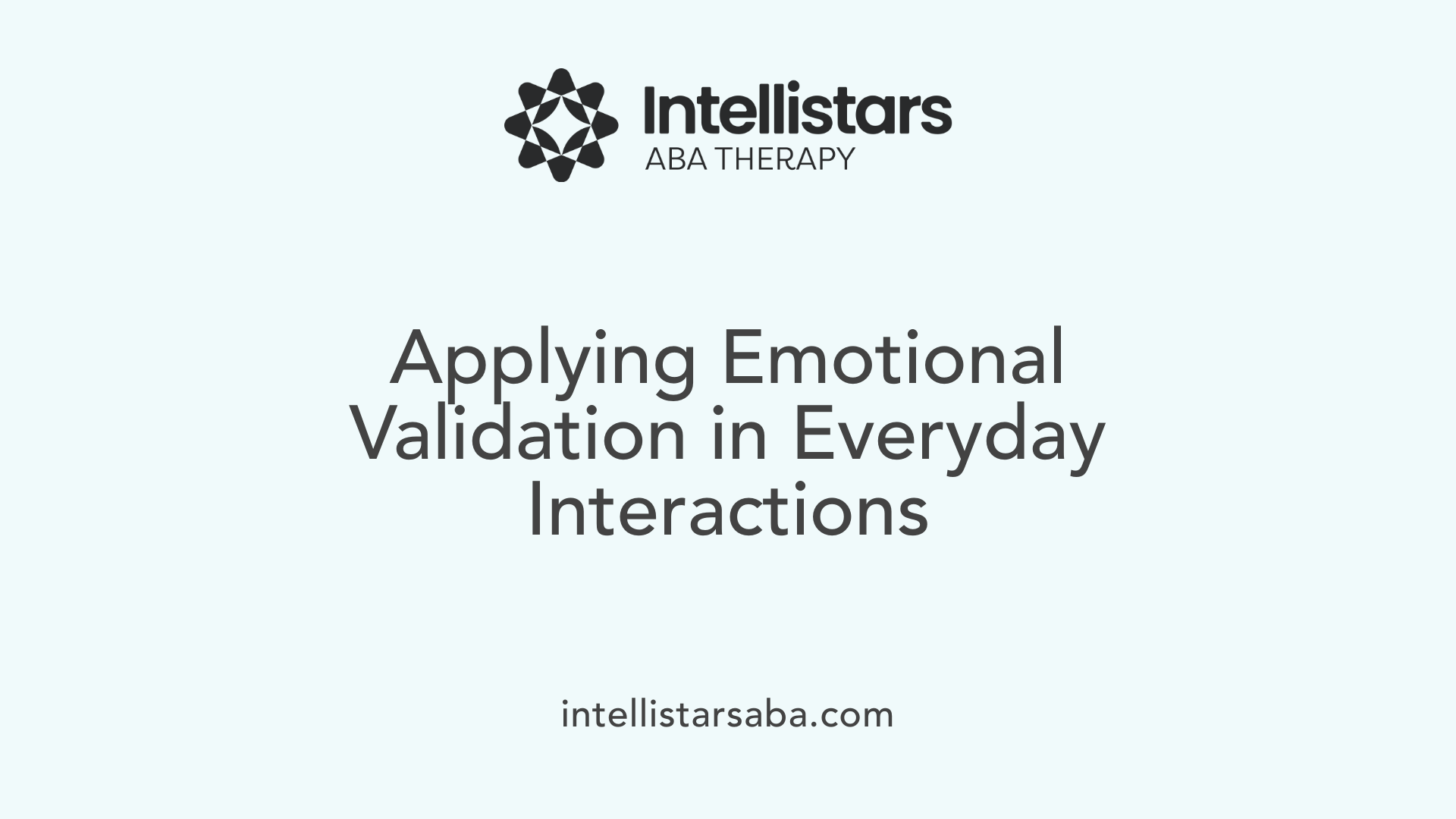 Emotional validation plays a vital role in everyday life, both personally and professionally. It involves recognizing, understanding, and accepting a person’s feelings without judgment, which helps build trust and strengthens relationships.
Emotional validation plays a vital role in everyday life, both personally and professionally. It involves recognizing, understanding, and accepting a person’s feelings without judgment, which helps build trust and strengthens relationships.
In personal settings, examples include actively listening when someone shares their feelings. For instance, if a friend talks about feeling overwhelmed at work, you might respond, "I understand why you feel overwhelmed," or "That sounds really stressful." Such statements acknowledge their emotions and demonstrate understanding.
During conflicts, listening and affirming emotions can de-escalate tension. You could say, "It’s okay to feel upset about this," or "Your feelings are valid," which helps the other person feel heard and respected.
Normalizing feelings with empathetic statements is another way to provide validation. For example, expressing, "Many people would feel the same way in this situation," helps someone realize their emotions are a common human experience and not something they should suppress.
Supporting others also involves asking meaningful questions that show genuine interest, such as, "Tell me more about what you’re experiencing," or "How can I support you right now?" These questions demonstrate that you value their feelings and are willing to offer help.
This approach is equally important in professional settings, especially in healthcare, education, and counseling. Validating emotions fosters a safe space, encourages open communication, and supports emotional regulation.
In summary, emotional validation can be practiced through attentive listening, acknowledging feelings, normalizing experiences, and asking supportive questions. These actions create a compassionate environment, reduce misunderstandings, and promote well-being.
| Example Situation | Validation Technique | Possible Response | Purpose |
|---|---|---|---|
| Friend shares feeling anxious before a presentation | Listening attentively | "I understand why you're anxious; that’s a normal feeling" | Builds trust and alleviates anxiety |
| Child is upset after losing a game | Recognizing and naming feelings | "It’s okay to feel upset after losing" | Promotes emotional regulation |
| Employee feels overwhelmed with tasks | Empathetic statement | "Many people feel stressed under deadlines; you’re not alone" | Normalizes emotions and supports resilience |
Conclusion: Cultivating a Culture of Validation for Growth and Well-being
Emotional validation plays a crucial role in strengthening relationships, enhancing self-confidence, and promoting overall psychological health. Recognizing and accepting someone’s feelings, without necessarily agreeing with them, helps build trust and fosters a safe space for emotional expression.
The benefits of validation extend beyond immediate comfort. Long-term, it supports better emotional regulation, reduces conflicts, and nurtures resilience. For children, validation aids in developing emotional intelligence and self-awareness, laying the foundation for healthy social interactions and self-esteem.
Creating an environment rich in validation encourages openness and empathy. When caregivers, educators, and peers consistently acknowledge emotions, individuals feel valued and understood. This approach helps prevent emotional distress, decreases negative behaviors, and promotes mental well-being.
Ultimately, fostering a culture of validation nurtures growth, reinforces connections, and nurtures emotional health across all ages, making it an essential component of nurturing supportive communities and healthy relationships.
Fostering Emotional Growth Through Validation
Incorporating emotional validation into daily interactions, therapy, and parenting fosters an environment where individuals can develop emotional resilience, self-awareness, and healthier relationships. Validation not only alleviates negative emotions but also encourages persistence, empathy, and secure attachment. As research continues to highlight its significance, embracing validation as a core human and therapeutic practice promises profound benefits for emotional and behavioral development at every stage of life.
References
- The Power of Emotional Validation in Building Stronger Relationships
- Validation in Parenting & Kids' Emotion Skills | MPG
- The who and what of validation: an experimental examination of ...
- The Essential Role of Therapy Validation in Mental Health Healing
- Emotional validation: A fundamental need in childhood and ...
- Emotional Validation - Psychology Today
- Children's Mental Health: Why It's Important to Validate Feelings
- What Is Validation in Therapy & Why Is It Important?
- Your feelings are reasonable: Emotional validation promotes ...
- The Crucial Role Validation Plays in Child Development






